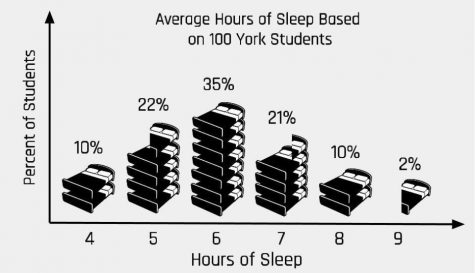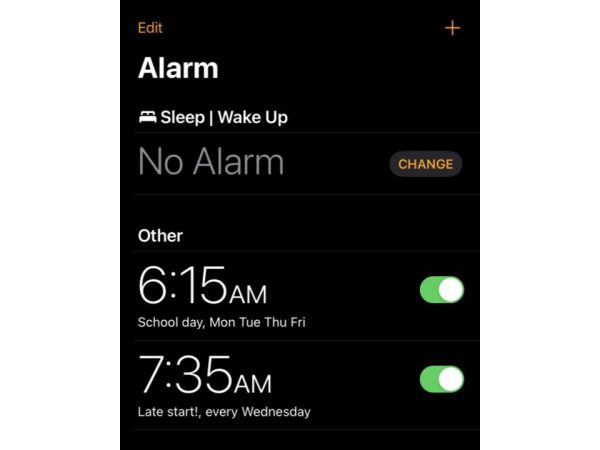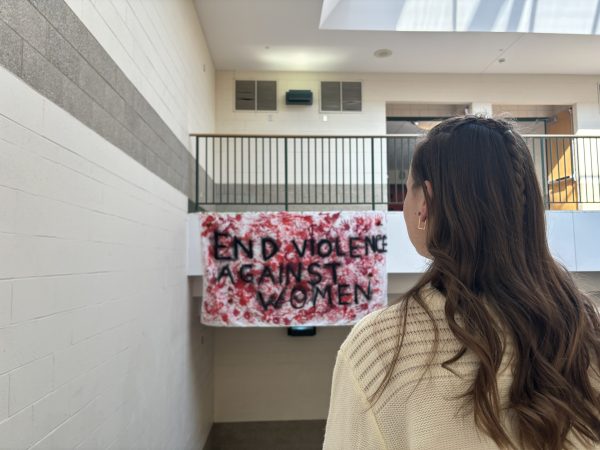Teenagers not catching enough Z’s

With summer break quickly approaching, most students are looking forward to sleeping. This past fall, the administration decided to start the school day five minutes earlier at York– causing busses to arrive sooner and alarms to ring earlier. The combination of an earlier start time along with homework, sports, and other activities has made the lack of sleep among students worse.
The National Sleep Foundation recommends eight to ten hours of sleep for people ages 14 to 17. According to a York-hi survey of students, the average York student gets six hours of sleep every night. A shockingly low 10% of students get the recommended eight hours of sleep. At an even lower number of students, two percent get nine hours of sleep. This amount of sleep does not suffice.
According to students, the root of the problem seems to be the amount of homework students are receiving every day. The majority of people assume that juniors have the heaviest workload; however, at York, freshmen, sophomores, and seniors are also struggling to be well rested.
Luke Southwell, freshman, said, “I get home pretty late due to sports and activities and have to then do all my homework which takes a while.”
Juniors also feel their lack of sleep kicking in along with the pressure of the workload they are receiving.
“I have a lot of homework and I have to prepare for the ACT,” said Junior Julia McColl. “The school expects me to finish all of my work and to be prepared for tests. So, if I have to stay until three in the morning to do that, I will — even if it means not sleeping.”
Not only do tests like the ACT prevent students from getting adequate hours of sleep, but sports do as well.
Junior Chuck Walsh said, “I have four workouts a day for football, and then homework when I get home. By the time I’m done with homework, I get to bed at one and get four hours of sleep, just to wake up and go to another morning workout.”
The question then becomes, what happens when one does not sleep eight hours or more. Does it truly affect their ability to function and succeed in school?
The answer is yes. A study completed by the Cleveland health clinic said that teenagers should sleep anywhere from eight to ten hours every day. When they do not sleep for this amount of time, the short-term consequences can include lack of alertness, impaired memory, and increased risk of having a car accident.
All of these consequences only become worse with time. A long-term lack of sleep can lead to depression, obesity, high blood pressure, and heart attacks.
Emily Locke is a junior who has been beginning to feel negatively affected in school by her sleep deprivation.
Personally, when I don’t get enough sleep, I definitely have less motivation to actively try and participate in class, and I also become less happy overall,” she said. “It becomes extremely hard to focus the next day; I lose motivation to accomplish daily tasks and it becomes harder to do well on tests or quizzes as opposed to if I was well rested.
— Emily Locke
But what can the school do to in order to help this growing problem?
Locke said, “One change the school could make would be to make every Wednesday a late start again like previous years or to try and be more lenient with due dates if multiple students ask. Clashing due dates and test dates from multiple classes often cause students to lose sleep trying to stay on top of everything.”
The administration has taken these cries of help into consideration; however, not only because of the students’ desire for a late start every week, but the teacher’s desire for a late start to have more time for collaboration.
Assistant Principal Drew McGuire said, “We have proposed to have a late start every Wednesday. Not only is it a benefit for kids to have the same schedule every week, but a combination of teachers and administration want more collaboration time.”
Teachers and administration are acknowledging students’ desire to get more sleep at night. In order for the growing sleep deprivation problem to end, a change needs to occur whether it be inside the classroom or at home. If we want to have healthy students, more sleep is necessary.

Kylie Travers is a senior at York. This year, she is Co-Editor-In-Chief of the York-hi. Other than her extremely passionate love of writing and reading...













